In What Ways Can I Learn to Trust God as I Recover From Porn Addiction?
What ACEs practice you accept?
In that location are 10 types of childhood trauma measured in the CDC-Kaiser Permanente Adverse Childhood Experiences Study. (There are many others…meet below.) Five are personal — physical abuse, verbal abuse, sexual corruption, physical neglect, and emotional neglect. 5 are related to other family members: a parent who'southward an alcoholic, a mother who's a victim of domestic violence, a family member in jail, a family unit fellow member diagnosed with a mental affliction, and experiencing divorce of parents. Each type of trauma counts as one. And then a person who'southward been physically driveling, with one alcoholic parent, and a mother who was beaten up has an ACE score of three.
In that location are, of course, many other types of childhood trauma — racism, bullying, watching a sibling being abused, losing a caregiver (grandmother, mother, grandfather, etc.), homelessness, surviving and recovering from a severe accident, witnessing a begetter being abused by a mother, witnessing a grandmother abusing a male parent, involvement with the foster care system, involvement with the juvenile justice system, etc. The ACE Study included but those 10 childhood traumas because those were mentioned as most mutual by a group of about 300 Kaiser members; those traumas were also well studied individually in the research literature.
The about important affair to retrieve is that the ACE score is meant every bit a guideline: If you experienced other types of toxic stress over months or years, then those would probable increase your risk of health consequences, depending on the positive babyhood experiences you lot had (run across below).
Prior to your 18th birthday:
- Did a parent or other adult in the household often or very often… Swear at you lot, insult you, put yous downwards, or humiliate you? or Act in a way that made you agape that you might be physically injure?
No___If Yeah, enter ane _ _ - Did a parent or other adult in the household often or very often… Push button, grab, slap, or throw something at you? or Always hitting you then difficult that you had marks or were injured?
No___If Aye, enter 1 _ _ - Did an adult or person at to the lowest degree 5 years older than you ever… Bear on or fondle y'all or have yous touch their torso in a sexual way? or Try or actually have oral, anal, or vaginal intercourse with yous?
No___If Yep, enter i _ _ - Did you often or very frequently feel that … No one in your family loved y'all or idea you were important or special? or Your family didn't look out for each other, feel close to each other, or support each other?
No___If Yes, enter 1 _ _ - Did you often or very oftentimes feel that … You didn't have enough to eat, had to habiliment dirty wearing apparel, and had no 1 to protect you? or Your parents were as well drunkard or high to have care of you or have you to the doctor if y'all needed it?
No___If Aye, enter i _ _ - Were your parents ever separated or divorced?
No___If Yes, enter 1 _ _ - Was your mother or stepmother:
Often or very frequently pushed, grabbed, slapped, or had something thrown at her? or Sometimes, often, or very often kicked, bitten, hit with a fist, or hit with something difficult? or Always repeatedly hit over at least a few minutes or threatened with a gun or knife?
No___If Aye, enter 1 _ _ - Did you live with anyone who was a problem drinker or alcoholic, or who used street drugs?
No___If Yes, enter ane _ _ - Was a household member depressed or mentally ill, or did a household member endeavour suicide? No___If Yep, enter i _ _
- Did a household member go to prison?
No___If Yes, enter 1 _ _
Now add upwards your "Yep" answers: _ This is your ACE Score
__________________________
Now that you know your ACEs, what does information technology mean?
First….a tiny scrap of background to help you effigy this out…..(if you lot want the back story about the fascinating origins of the ACE Study, read The Agin Childhood Experiences Written report — the largest, about important public health study you never heard of — began in an obesity clinic.)
The CDC's Adverse Babyhood Experiences Report (ACE Report) uncovered a stunning link betwixt childhood trauma and the chronic diseases people develop equally adults, equally well equally social and emotional issues. This includes eye disease, lung cancer, diabetes and many autoimmune diseases, equally well equally depression, violence, beingness a victim of violence, and suicide.
The outset inquiry results were published in 1998, followed by more than than lxx other publications through 2015. They showed that:
- childhood trauma was very common, even in employed white middle-grade, college-educated people with great health insurance;
- there was a directly link between childhood trauma and developed onset of chronic disease, likewise every bit depression, suicide, being fierce and a victim of violence;
- more types of trauma increased the adventure of health, social and emotional problems.
- people usually feel more than than i type of trauma – rarely is it just sexual practice corruption or only verbal corruption.
A whopping two thirds of the 17,000 people in the ACE Report had an ACE score of at to the lowest degree ane — 87 percent of those had more than ane. Thirty-six states and the Commune of Columbia have washed their own ACE surveys; their results are similar to the CDC'southward ACE Study.

The written report's researchers came up with an ACE score to explain a person's adventure for chronic disease. Recall of it as a cholesterol score for childhood toxic stress. You get one point for each type of trauma. The higher your ACE score, the higher your risk of health and social problems. (Of grade, other types of trauma exist that could contribute to an ACE score, and then it is conceivable that people could have ACE scores higher than 10; however, the ACE Written report measured just 10 types.)
As your ACE score increases, so does the hazard of disease, social and emotional problems. With an ACE score of 4 or more, things start getting serious. The likelihood of chronic pulmonary lung disease increases 390 percent; hepatitis, 240 percent; low 460 percent; attempted suicide, 1,220 percentage.
(By the fashion, lest you retrieve that the ACE Study was yet some other involving inner-urban center poor people of colour, have notation: The study'south participants were 17,000 mostly white, middle and upper-middle class higher-educated San Diegans with good jobs and great health care – they all belonged to the Kaiser Permanente wellness maintenance arrangement. Prior to the ACE Study, most enquiry nigh furnishings of abuse, neglect, etc., involved poor people of color who live in the inner city. And so the notion was that it was inner-city people of colour who experienced abuse, fail, etc., non white middle-class or white upper-class people….that somehow white people of ways were allowed from the kinds of bug affecting people who were poor. That'south not only ridiculous, just it was only another fashion to perpetrate racism and classism. The ACE Written report quashed that notion. So, it's non that I'm maxim that the ACE Written report is apparent because it was washed on white people, I'yard proverb that the ACE Study opened the door to an understanding that ACEs are at the root of well-nigh all problems of physical, mental, economic and social wellness in humans, no matter where in the earth those humans live. The ACE Report and the other research that makes upwards ACEs science provided an opening to a amend understanding of the constructs that make up our notion of why people suffer ill health — concrete, mental, economic, social — and that includes systemic racism. )
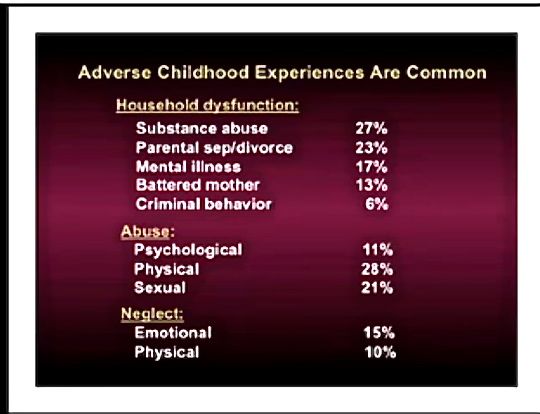
Here are some specific graphic examples of how increasing ACE scores increase the risk of some diseases, social and emotional problems. All of these graphs come from "The relationship of adverse babyhood experiences to developed health, well being, social function and wellness care", a book affiliate by Drs. Vincent Felitti and Robert Anda, co-founders of the ACE Study, in "The Hidden Epidemic: The Impact of Early on Life Trauma on Health and Disease."
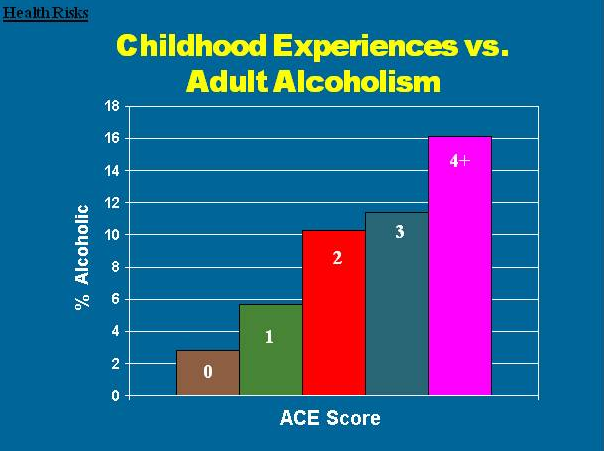
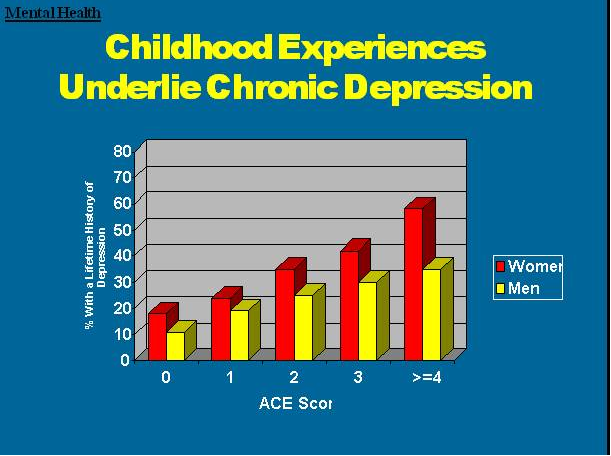
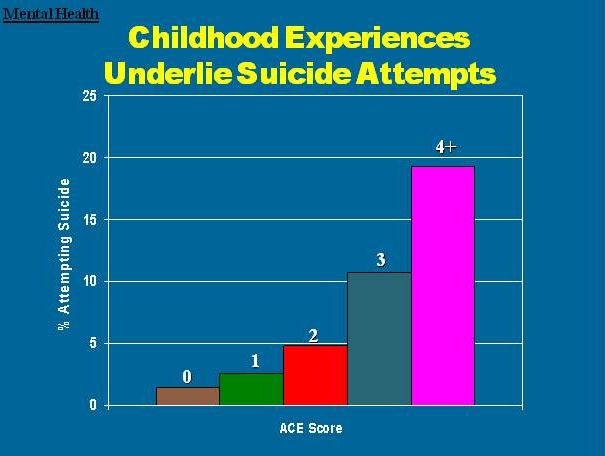
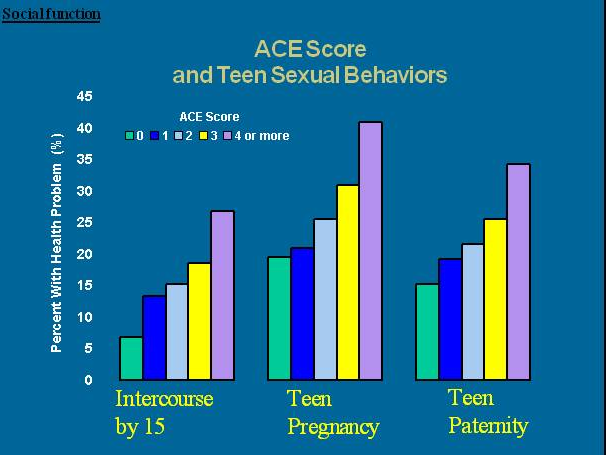
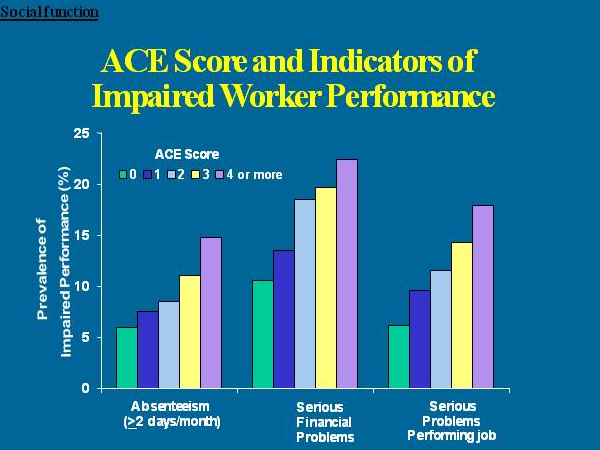
What causes this?
At the same time that the ACE Study was being done, parallel research on kids' brains found that toxic stress damages the structure and function of a child'due south developing brain. This was determined past a group of neuroscientists and pediatricians, including neuroscientist Martin Teicher and pediatrician Jack Shonkoff , both at Harvard University, neuroscientist Bruce McEwen at Rockefeller University, and child psychiatrist Bruce Perry at the Child Trauma University .
When children are overloaded with stress hormones, they're in flight, fright or freeze mode. They can't larn in school. They oftentimes have difficulty trusting adults or developing healthy relationships with peers (i.e., they go loners). To relieve their feet, depression, guilt, shame, and/or inability to focus, they plough to hands available biochemical solutions — nicotine, alcohol, marijuana, methamphetamine — or activities in which they can escape their problems — high-run a risk sports, proliferation of sex partners, and work/over-accomplishment. (due east.yard. Nicotine reduces anger, increases focus and relieves depression. Alcohol relieves stress.)
Using drugs or overeating or engaging in risky behavior leads to consequences as a straight event of this beliefs.
For example, smoking tin lead to COPD (chronic obstructive pulmonary disease) or lung cancer. Overeating tin can lead to obesity and diabetes. In addition, at that place is increasing inquiry that shows that severe and chronic stress leads to actual systems producing an inflammatory response that leads to illness.
In addition, toxic stress can be passed down from generation to generation. The field of epigenetics shows that nosotros are born with a set of genes that tin be turned on and off, depending on what's happening in our environment. If a child grows upwardly with an overload of toxic stress, their stress-response genes are likely to exist activated so that they are hands triggered by stressful situations that don't affect those who don't grow up with toxic stress. They can laissez passer that response onto their children.
Fortunately, brains and lives are somewhat plastic. Resilience research shows that the appropriate integration of resilience factors — such every bit asking for help, developing trusting relationships, forming a positive attitude, listening to feelings — can assistance people meliorate their lives.
For more than information well-nigh ACEs science and how it's existence used, go to: PACEs Science 101.
Here's a link to the long questionnaire (200+ questions).
For more information about PACEs science, go to PACEs Scientific discipline 101.
_______________________
What are PCEs — positive childhood experiences?
Although there is still much to learn about ACEs and how to prevent and mitigate their furnishings, we also all know that childhood experiences are not limited to those that involve adversity. All childhood experiences matter. In the last few years, researchers have started to examine the impacts of positive childhood experiences (PCEs) on children and adults.
In 2019, a team of researchers — Dr. Christina Bethell, Jennifer Jones, Dr. Narangerel Gombojav, Dr. Jeff Linkenbach and Dr. Robert Sege — found a dose-response association between positive childhood experiences and adult mental and relationship health among adults who had experienced ACEs, irrespective of how many ACEs they had. This means that it'south really of import to take positive babyhood experiences, no affair how much adversity you have in your life. And if you accept a lot of adversity and a lot of positive childhood experiences, you are less likely to suffer the consequences of ACEs. However if you have no positive childhood experiences and few ACEs, the consequences of the ACEs are more likely to announced. Positive Babyhood Experiences and Adult Mental and Relational Wellness in a Statewide Sample: Associations Across Adverse Babyhood Experiences Levels | JAMA Pediatrics.
To notice out what positive childhood experiences y'all take, reply the post-obit questions. How much or how oftentimes during your babyhood did you:
- feel able to talk to your family about feelings;
- experience your family unit stood by yous during difficult times;
- enjoy participating in community traditions;
- feel a sense of belonging in loftier schoolhouse;
- feel supported by friends;
- take at least two non-parent adults who took genuine interest in you; and
- experience safe and protected by an adult in your domicile.
- Also in 2019, Bethell, Gombojav, and Dr. Robert Whitaker reported that at each level of ACEs, "the presence of flourishing increased in a graded style with increasing levels of family resilience and connection." Family Resilience And Connexion Promote Flourishing Among United states Children, Even Among Adversity | Health Affairs
- In 2014, Bethell, Dr. Paul Newacheck, Dr. Eva Hawes, and Dr. Neal Halfon plant that children with higher ACE scores were less likely to demonstrate resilience, live in a protective home environment, accept a mother who was salubrious, and live in safe and supportive neighborhoods. However, well-nigh half of the children who had experienced ACEs as well demonstrated resilience, and "resilience mitigated the bear upon of adverse babyhood experiences on grade repetition and schoolhouse appointment." Adverse Childhood Experiences: Assessing The Impact On Health And Schoolhouse Engagement And The Mitigating Function Of Resilience | Health Diplomacy
- In a report published in 2021, Whitaker, Dr. Tracy Famine-Wesley, and Dr. Allison Herman wrote that "greater childhood family connection was associated with greater flourishing in The states adults across levels of childhood adversity." Babyhood family connection and developed flourishing: associations across levels of childhood adversity – Bookish Pediatrics (academicpedsjnl.net)
- Dr. Yui Yamaoka and Dr. David Bard reported in 2022 that "the number of adverse babyhood experiences was associated with both social-emotional deficits and developmental filibuster risks in early childhood; still, positive parenting practices demonstrated robust protective effects contained of the number of agin babyhood experiences." Positive Parenting Matters in the Face of Early Adversity – PubMed (nih.gov)
- Among juvenile offenders, Dr. Michael Baglivio and Dr. Kevin Wolff discovered in 2022 that "high ACE scores were associated with increased reoffending, and high PCE scores were associated with decreased recidivism, as measured by both rearrest and reconviction. Further, amongst juveniles with four or more ACEs who have vi or more PCEs, reconviction was 23% lower and rearrest 22% lower when compared to those youth with four or more ACEs and less than half dozen PCEs, controlling for a host of demographic and criminal history measures." Positive Childhood Experiences (PCE): Cumulative Resiliency in the Face of Adverse Babyhood Experiences – Michael T. Baglivio, Kevin T. Wolff, 2022 (sagepub.com)
- Dr. Michael Baxter, Dr. Eden Hemming, Dr. Heather McIntosh, and Dr. Chan Hellman published research in 2022 that demonstrated that higher ACEs scores were associated with lower hope in a written report of caregivers who brought children in for a kid abuse medical investigation at a kid advancement center. Exploring the Relationship Between Adverse Babyhood Experiences and Promise: Periodical of Child Sexual Abuse: Vol 26, No 8 (tandfonline.com)
- In 2019, Dr. AliceAnn Crandall, Dr. Jacob Miller, Dr. Aaron Cheung, Dr. Lynneth Novilla, Dr. Rozalyn Glade, Dr. M. Lelinneth Novilla, Dr. Brianna Magnusson, Dr. Barbara Leavitt, Dr. Michael Barnes, and Dr. Carl Hanson observed in a study of adults that "higher counter-ACEs scores [i.eastward., positive babyhood experiences] were associated with improved developed health and that counter-ACEs neutralized the negative impact of ACEs on adult health." ACEs and counter-ACEs: How positive and negative babyhood experiences influence developed wellness – ScienceDirect
- A study by Whitaker, Dearth-Wesley, and Herman in 2022 showed that across levels of babyhood adversity, greater babyhood family unit connection was associated with greater flourishing amid young adults with blazon 1 diabetes.Babyhood Family unit Connection With Flourishing in Young Adulthood Amidst Those With Type one Diabetes | Pediatrics | JAMA Network Open | JAMA Network
- Finally, in 2016, Bethell, Gombojav, Dr. Michele Solloway, and Dr. Lawrence Wissow examined ACEs, resilience, family protective factors, and emotional, mental or behavioral weather condition (EMB) in children and youth in the U.S. The authors found that children with ACEs had higher EMB than children without ACEs, but the presence of resilience was significantly associated with lower amounts of EMB for both children with and without ACEs. In addition, the prevalence of EMB was lower when family protective factors were nowadays, even if the child had ACEs, although the presence of 2 or more ACEs decreased the event. Adverse Childhood Experiences, Resilience and Mindfulness-Based Approaches: Common Denominator Bug for Children with Emotional, Mental, or Behavioral Problems (nih.gov)
In terms of research, these are still early days, says Dr. Robert Whitaker, director of Research and Research Education at the Columbia-Bassett Program and professor of Clinical Pediatrics in the Vagelos College of Physicians and Surgeons at Columbia University: "This expanse of PACEs research is emerging, but the boundaries of that research have not really been defined, detail every bit complement to the well-established body of research on resilience."
From "Brains: Journeying to Resilience", Alberta Family unit Health Initiative.
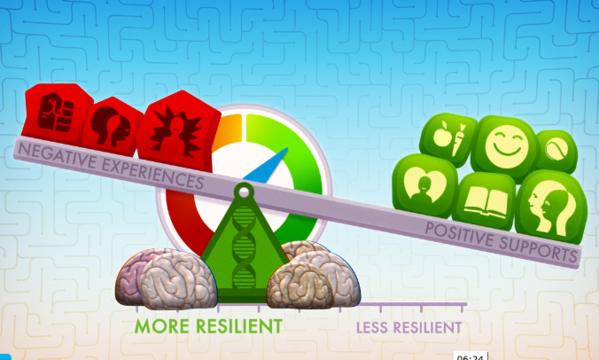
"PCEs may have lifelong consequences for mental and relational health despite co-occurring adversities such as ACEs," noted Dr. Christina Bethell in Positive Babyhood Experiences and Adult Mental and Relational Wellness in a Statewide Sample: Associations Across Adverse Childhood Experiences Levels. Bethell is professor at Johns Hopkins University in the Bloomberg Schoolhouse of Public Health and founding manager of the Child and Adolescent Health Measurement Initiative. "In this way, they back up awarding of the Globe Health Organization'south definition of wellness emphasizing that health is more than the absence of disease or adversity. The World Wellness Organization'southward positive construct of health is aligned with the proactive promotion of positive experiences in childhood because they are foundational to optimal childhood evolution and adult flourishing."
Still, in terms of integrating what we know nigh PACEs, nosotros have enough information to continue integrating the science into our work. If nosotros want to change individuals, organizations, communities, and systems we demand to talk about both positive and agin childhood experiences — PACEs — and how they intertwine throughout our lives….
- At the individual level, learning well-nigh ACEs helps u.s.a. understand why nosotros behave the way we do, and that our coping behavior is normal…a normal response to abnormal circumstances. Learning almost PCEs provides management to heal. The primal concept well-nigh PACEs is that learning near both, together, can help meliorate our health and well-being. It gives united states hope.
- At the organizational level, staff and leaders tin can apply knowledge of PACEs to create healing-centered piece of work environments and programs in all sectors.
- At the community level, educating the public nearly PACEs tin provide hope and foster the evolution of innovative ideas about how to support families, organizations and communities. Understanding the interplay betwixt positive and adverse experiences offers opportunity for engagement with all sectors. Communities can use this new lens to create mindful, healing-centered, research-informed approaches to prevent adversity and encourage connectedness and healing.
- At the arrangement level, policymakers and leaders can use enquiry about PACEs to find common footing across fields and to support policies that promote the understanding of PACEs and how adversity and positive experiences piece of work together.
At to the lowest degree two organizations are taking this approach and doing research to guide their actions:
- The Salubrious Outcomes from Positive Experiences (Hope) team at Tufts Medical Center accept identified four building blocks that lessen the negative effects of ACEs: relationships, environments, engagement, and social emotional evolution. Hope – Healthy Outcomes from Positive Experiences
- The Hope Enquiry Center at the University of Oklahoma, Tulsa, focuses its research on the "science and ability of hope every bit a psychological strength, specially among those experiencing trauma and adversity." The Middle defines hope as "the conventionalities that the future volition be better and you take the power to make it and then." Hope Enquiry Center (ou.edu)
randolphwifforge53.blogspot.com
Source: https://acestoohigh.com/got-your-ace-score/
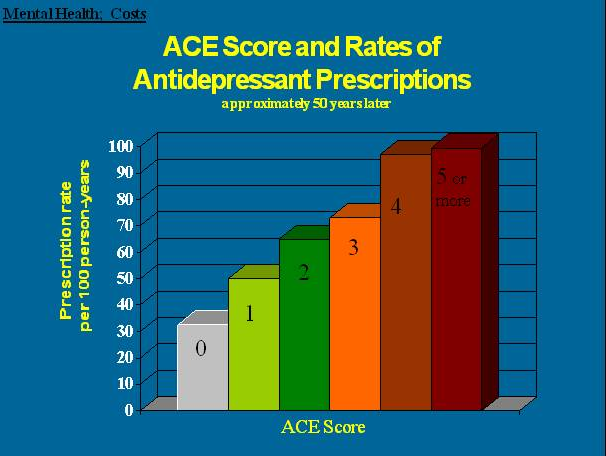
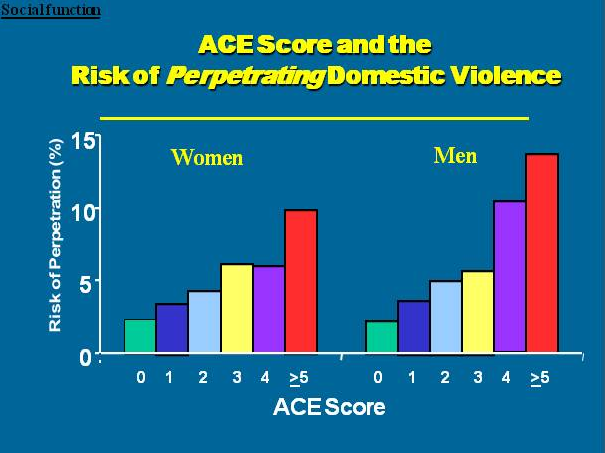
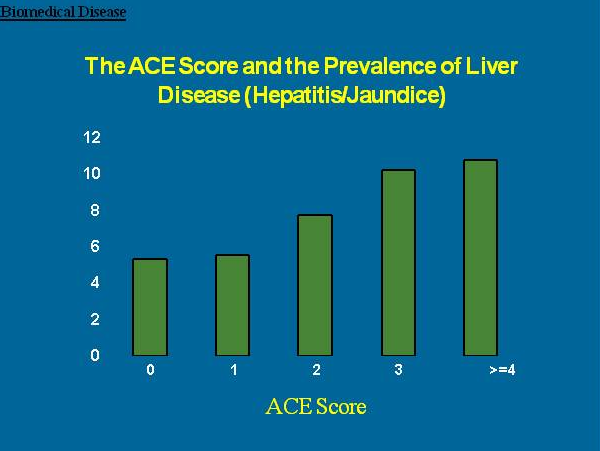
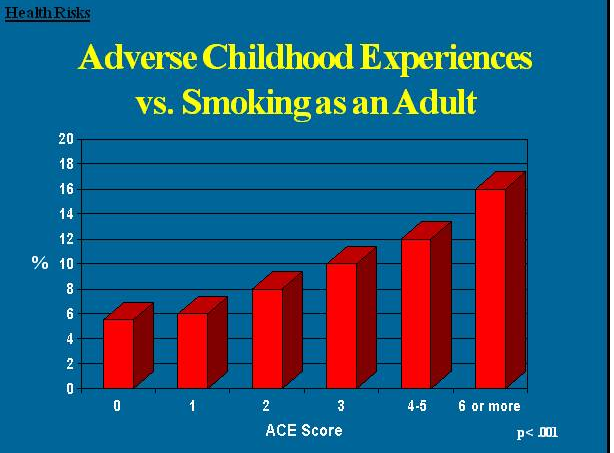
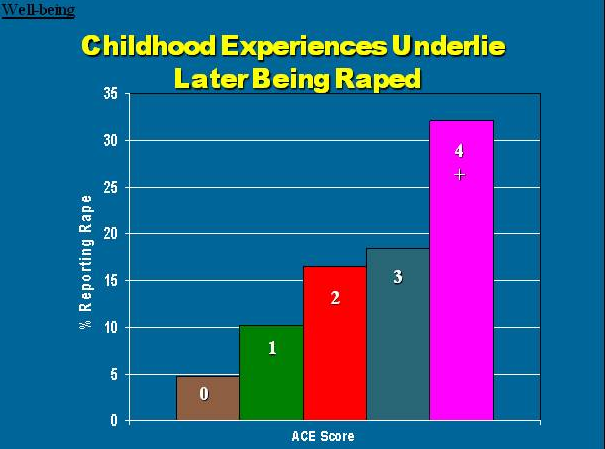
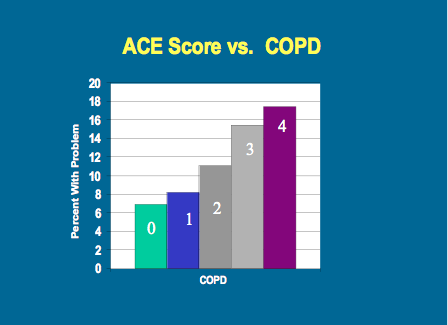
0 Response to "In What Ways Can I Learn to Trust God as I Recover From Porn Addiction?"
Post a Comment